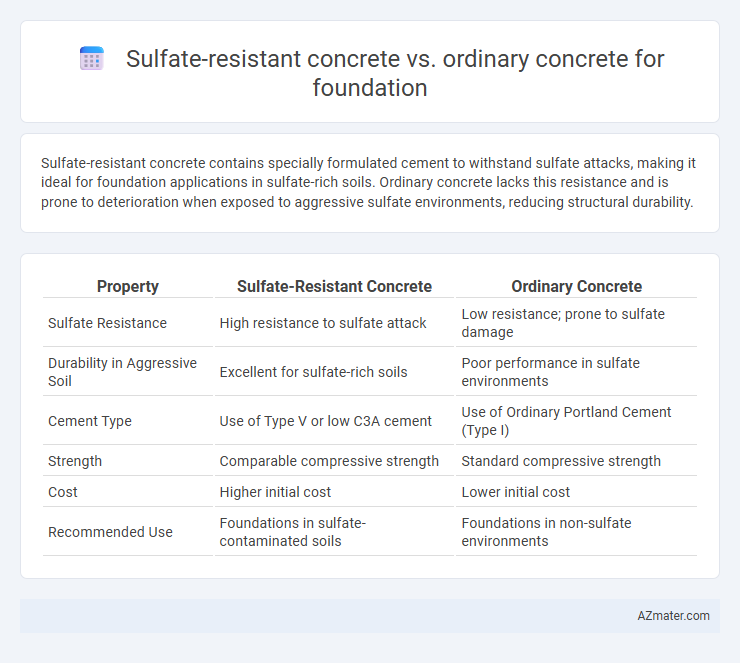Sulfate-resistant concrete contains specially formulated cement to withstand sulfate attacks, making it ideal for foundation applications in sulfate-rich soils. Ordinary concrete lacks this resistance and is prone to deterioration when exposed to aggressive sulfate environments, reducing structural durability.
Table of Comparison
| Property | Sulfate-Resistant Concrete | Ordinary Concrete |
|---|---|---|
| Sulfate Resistance | High resistance to sulfate attack | Low resistance; prone to sulfate damage |
| Durability in Aggressive Soil | Excellent for sulfate-rich soils | Poor performance in sulfate environments |
| Cement Type | Use of Type V or low C3A cement | Use of Ordinary Portland Cement (Type I) |
| Strength | Comparable compressive strength | Standard compressive strength |
| Cost | Higher initial cost | Lower initial cost |
| Recommended Use | Foundations in sulfate-contaminated soils | Foundations in non-sulfate environments |
Introduction to Concrete Foundations
Concrete foundations require materials that withstand environmental stressors; sulfate-resistant concrete offers enhanced durability against sulfate attacks common in soil and groundwater. Ordinary concrete, though widely used, may deteriorate faster in sulfate-rich conditions, leading to structural integrity issues. Selecting sulfate-resistant concrete for foundations ensures prolonged lifespan and reduced maintenance in aggressive sulfate environments.
What is Sulfate-Resistant Concrete?
Sulfate-resistant concrete is a specialized type of concrete formulated to withstand damage caused by sulfate ions typically found in soil and groundwater, making it ideal for foundation applications in sulfate-rich environments. It incorporates low C3A (tricalcium aluminate) cement or uses supplementary cementitious materials like fly ash or slag to enhance sulfate resistance and prevent chemical reactions that lead to expansion and deterioration. Unlike ordinary concrete, sulfate-resistant concrete offers enhanced durability, reducing the risk of cracking, spalling, and structural failure in foundations exposed to aggressive sulfate conditions.
Understanding Ordinary Concrete
Ordinary concrete, commonly used for foundations, consists of cement, water, sand, and aggregates but lacks specialized resistance to sulfate attacks found in aggressive soil or groundwater conditions. Over time, sulfate ions can penetrate ordinary concrete, causing chemical reactions that lead to expansion, cracking, and deterioration, compromising structural integrity. Understanding this vulnerability highlights the importance of selecting materials like sulfate-resistant concrete for foundations exposed to high sulfate environments.
Chemical Composition Differences
Sulfate-resistant concrete contains low tricalcium aluminate (C3A) content, typically below 5%, which reduces its susceptibility to sulfate attack, while ordinary concrete has higher C3A levels that react with sulfates causing expansion and cracking. The binder in sulfate-resistant concrete often uses Type V Portland cement or incorporates supplementary cementitious materials like fly ash or slag, enhancing chemical durability against sulfate ions. In contrast, ordinary concrete relies on standard Portland cement with a higher aluminate phase, making it less chemically stable in sulfate-rich environments, leading to faster degradation of foundation structures.
Sulfate Attack: Causes and Effects on Concrete
Sulfate-resistant concrete incorporates specialized cement types, such as Type V Portland cement, to withstand sulfate attack prevalent in sulfate-rich soils and groundwater. Sulfate attack causes expansive reactions within concrete, leading to cracking, spalling, and loss of structural integrity, especially critical in foundation applications. Ordinary concrete lacks this resistance, making it vulnerable to chemical degradation, reduced durability, and premature failure when exposed to high sulfate environments.
Durability and Longevity Comparisons
Sulfate-resistant concrete, specifically formulated with low C3A cement and supplementary cementitious materials like fly ash or slag, significantly enhances durability in sulfate-rich soil environments compared to ordinary concrete. Its chemical composition minimizes sulfate attack, preventing expansion, cracking, and deterioration, which commonly affects ordinary concrete foundations exposed to aggressive sulfate ions. Consequently, sulfate-resistant concrete offers superior longevity and structural integrity for foundations in high sulfate conditions, reducing maintenance and repair costs over time.
Cost Implications for Foundation Projects
Sulfate-resistant concrete typically costs 10-20% more than ordinary concrete due to the use of specialized cement types like Type V Portland cement, which enhances durability in sulfate-rich soils. However, the higher initial investment can lead to long-term savings by reducing maintenance, repair, and replacement costs in foundations exposed to aggressive sulfate environments. For foundation projects in sulfate-prone areas, selecting sulfate-resistant concrete optimizes lifecycle cost efficiency despite its higher upfront expense.
Environmental Suitability and Application Scenarios
Sulfate-resistant concrete is specifically formulated to withstand high sulfate concentrations in soil and groundwater, making it ideal for foundations in aggressive environments such as coastal areas and sewage treatment plants. Ordinary concrete lacks this resistance, leading to faster deterioration and reduced structural integrity in sulfate-rich conditions. For foundations exposed to sulfate attack, sulfate-resistant concrete ensures enhanced durability and longer service life, while ordinary concrete remains suitable for low-sulfate, non-aggressive environments.
Maintenance Requirements and Lifecycle Performance
Sulfate-resistant concrete significantly reduces maintenance needs in foundation applications by resisting sulfate-induced deterioration, which commonly causes cracking and spalling in ordinary concrete. The enhanced durability of sulfate-resistant concrete results in a longer lifecycle performance, minimizing repair frequency and extending structural integrity in sulfate-rich soil environments. In contrast, ordinary concrete foundations often require frequent inspections and remedial measures to address sulfate attack, increasing long-term maintenance costs and reducing overall lifespan.
Choosing the Right Concrete for Foundation: Key Considerations
Sulfate-resistant concrete contains specialized cement types like Type V Portland cement, designed to withstand high sulfate environments common in foundation soils, preventing chemical deterioration and enhancing durability. Ordinary concrete, typically made with Type I or II cement, may suffer significant structural damage when exposed to sulfates, making it unsuitable for foundations in aggressive sulfate-rich conditions. Choosing the right concrete requires evaluating soil sulfate levels, exposure conditions, and long-term performance needs to ensure foundation stability and longevity.

Infographic: Sulfate-resistant concrete vs Ordinary concrete for Foundation
 azmater.com
azmater.com